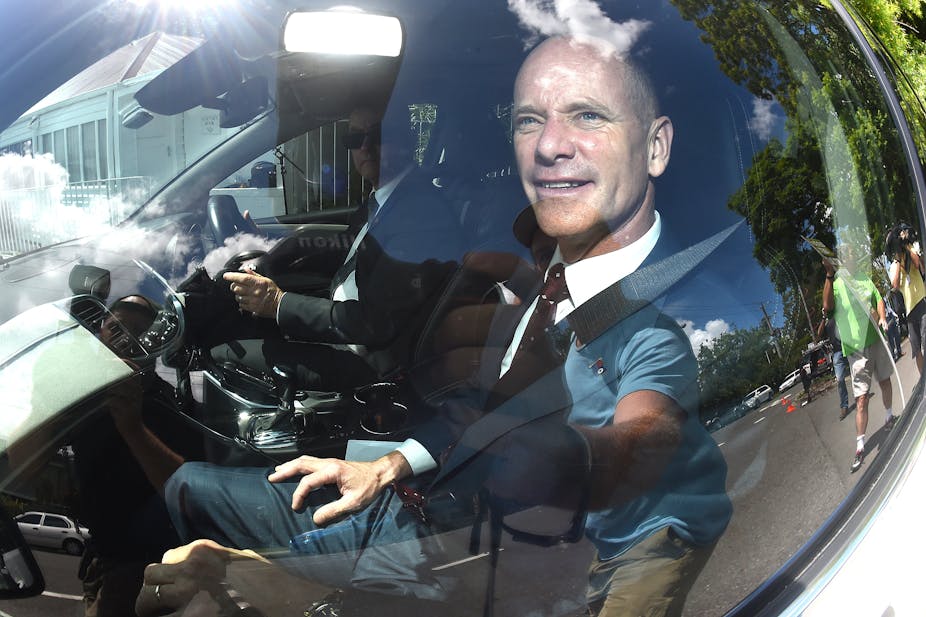The biggest battle Campbell Newman faces in the Queensland election on January 31 is the one against himself.
The election, called on Tuesday morning, will be a referendum on the achievements of the Premier: his strengths, weaknesses and ability to set the agenda for his government’s second term. This will be a presidential-style election.
The Liberal National government has been working hard to establish its record as “strong”, in contrast to what it calls its “weak” and “soft” opponents. While Newman will inevitably target the ALP, and its leader Annastacia Palaszczuk, the opposition’s response to this criticism is likely to have little effect on the outcome.

It’s no coincidence that strength has been a dominant theme throughout Newman’s three-year term. The government’s central policy program is called Strong Choices, and “strong” has been the defining word used by this government ever since it was launched last year.
Newman has marketed himself to the electorate as the man that will make the tough decisions in order to fix the economy; the leader of “a strong team with a strong plan” for Queensland. It’s designed to remind voters of the previous Bligh Labor government, which the LNP has repeatedly characterised as weak and reckless.
There is no doubt that the LNP will remain in government, simply because of its enormous majority. However, the size of this majority will ultimately be decided by Newman’s performance, and what voters think of the “strong” sales pitch.
Howard’s lessons for Queensland
The LNP will attempt to borrow from the success of the Howard government in both the 2001 and 2004 federal elections. In both these elections, the former prime minister built his campaigns on the theme of economic management in order to project strength.
In Newman’s case, he may well reprise the line that worked so well for him when he defeated Anna Bligh in 2012, especially to claim that the Queensland economy is “back on track”.

Newman will also campaign on law and order issues, particularly his policies targeting bikie gangs and criminal activity. This will also be used in an attempt to highlight Newman’s “strong” leadership, and his ability to make decisions that will ultimately make Queensland a safer place to live, particularly considering that some bikies have publicly endorsed the ALP, which has promised to repeal the anti-bikie laws and replace them with a new approach to organised crime.
However, campaigning on this theme will create a double-edged sword.
Critics of Newman will emphasise the government’s wide-ranging public service job cuts, and the decision to effectively privatise government-owned assets through long-term leases.
The ALP will use these issues to contrast Newman’s theme of strength and label the LNP an autocratic party, subject to the whims and objectives of one man, the Queensland Premier. Once again, it’s a strategy is built around a single theme: does the Queensland electorate agree with the choices that Newman has made?
A federal election forerunner
In a number of ways, the Queensland election may well prove to be a forerunner to the next federal election.

Like Prime Minister Tony Abbott, Newman has become a polarising leadership figure in Queensland. The LNP’s strength strategy has a potential to backfire, because the outcome is so dependent upon the leader’s performance during the campaign.
But unlike Abbott, who holds a safe Liberal seat in Sydney, Newman faces a personal fight for survival in this election. In his Brisbane electorate of Ashgrove, he is facing a strong challenge of his own from the former Labor MP he defeated at the last election, Kate Jones.
The key to a successful campaign for Newman is not only to promote strong leadership, but to complement this strength with personality traits that make him palatable to voters.
If this strategy succeeds, the federal Coalition may well use this style of campaign as a template when Abbott calls an election some time in the next year.
Newman’s ability to exude strength will be his greatest test, both in deciding whether he can hold his own seat, but also in determining the long-term fate of the government that he leads.

